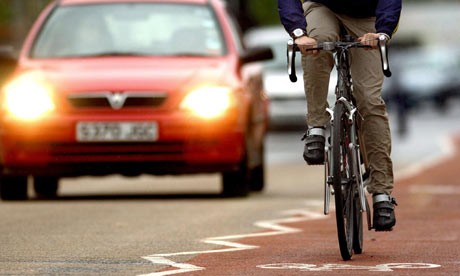
Blame is hard to prove, but campaigners argue trifling penalties gives little incentive for drivers to change their behaviour
Is a £200 fine and three points on your licence an appropriate punishment for killing a cyclist on the road? According to Kingston magistrates' court, where last month Joao Lopes pleaded guilty to "driving while eyesight was such that you could not comply with the requirements of a prescribed eye test", it is.
Lopes was driving his 32-tonne tipper truck, without wearing glasses, on 5 February 2009 when he ran over Eilidh Cairns, a 30-year-old TV producer cycling to work in front of him.
You could argue that the knowledge he has ended a life is enough of a punishment for Lopes, but what about his employer? They haven't even lost their driver to a ban, let alone endured investigation or possible punishment for failing to ensure their staff are safe on the roads.
A lack of witnesses meant that Lopes could not be prosecuted for dangerous driving. This is a common problem in cycling fatalities where things go wrong so quickly. It is rare that passers-by see and can clearly recount the whole incident.
Campaigners argue that it's not about punishing individuals, but about forcing the industry to take cyclists' deaths seriously. Amy Aeron-Thomas, executive director of road safety charity RoadPeace, says:
Killing someone on the road needs to be more costly. The freight industry will invest in safety if it's protecting their employees or their vehicles. The problem with cyclists is that their deaths aren't costly.
Without stiffer penalties a company has little incentive to bring in procedures, equipment and training that could prevent future deaths. Cynthia Barlow, whose daughter Alex was killed as she cycled to work in 2000, says that the lorry drivers companies need to be held more culpable:
I think there should be more prosecutions for corporate manslaughter, just to get across to the lorry companies what they are responsible for. They are responsible for people's lives. They need to take it seriously.
Barlow also says that the investigation into cycling fatalities, both by the police and the industry, needs to be improved. While investigating Cairns's death, the police didn't test Lopes's eyesight on the day of the crash, despite the fact that his account of what happened – "I didn't see her" – surely suggested this. It wasn't until three months later that they finally tested his eyes and it was found that he could not read a number plate from a distance of 13 metres, a requirement for HGV drivers. Barlow says:
There needs to be a proper investigation, not to prosecute the driver but to make sure someone's thinking about what they can do to prevent these things because they are all preventable, without a doubt. And we should be preventing them.
A worrying suggestion is that the reason the authorities do not take cyclists' deaths seriously is because they think that cycling in big cities is a dangerous activity anyway, and injury is thus an unfortunate inevitability. At the inquest into Cairns's death in January 2010 the coroner, Dr Shirley Radcliffe, said that deaths such as Eilidh's were "not an uncommon occurrence in London" and "cycling groups and the police will be grappling with this for a very long time" without making any recommendations about how to save cyclists' lives.
As cycling becomes more mainstream and is actively encouraged, for the benefit of public health and the environment, this unhelpful attitude has to change.
Cairns's family are now challenging the accidental death ruling at her inquest. There is a web of responsibility on the roads to prevent against harm – can any death there ever be completely an accident? It is arguable that someone must be responsible and take responsibility to prevent deaths like Eilidh's which devastate everyone from her heartbroken parents to the children on their way to school who saw her under the wheel of the truck.
More and more people are cycling, whether to and from work or for leisure, around the entire country. Successive governments have been officially signed up to getting more Britons their bikes. The least they can do is try to ensure their safety and when injury or worse does happen, treat it with sufficient attention.
From guardian.co.uk
